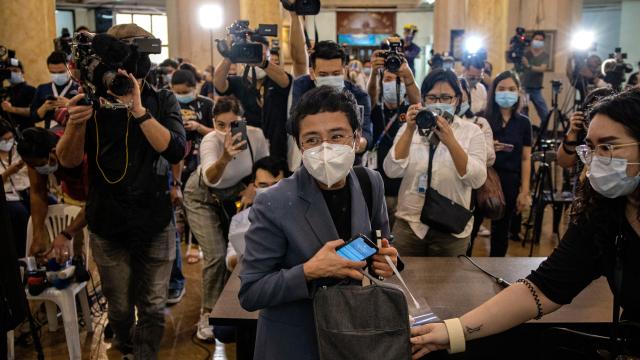It may not be immediately clear why a cyber libel case from the Philippines matters in the U.S., but the guilty verdict for Maria Ressa, the chief executive of an independent news site called Rappler, has serious implications for the free press and free speech worldwide.
This particular cyber libel charge revolves around a 2012 article that cited an intelligence report linking businessman Wilfredo Keng to murder, as well as human and drug trafficking. But while Rappler as a publication was found to have no liability, Ressa and Reynaldo Santos Jr, a former Rappler researcher and writer, were both found individually guilty and fined 200,000 pesos (roughly $US4,000 ($5,818)) in “moral damages” and another 200,000 in “exemplary damages.” Both Ressa and Santos were allowed to post bail and can appeal to higher courts. However, the court did sentence Ressa and Santos to serve a minimum of 6 months and 1 day in prison and they could face a maximum of 6 years behind bars.
[referenced url=”https://gizmodo.com.au/2020/05/trumps-executive-order-on-social-media-is-the-worst-kind-of-bullshit/” thumb=”https://gizmodo.com.au/wp-content/uploads/2020/05/29/lsd07xxzcmbx6no5jnt3-300×169.jpg” title=”Trump’s Executive Order on Social Media Is the Worst Kind of Bullshit” excerpt=”On Thursday, Donald Trump escalated his inane, frothing, and mostly one-sided feud with Twitter and other social media companies he has accused of silencing right-wing voices online to a dangerous, legally questionable new level.”]
The charges were fishy from the outset, as the story in question is a 7-year-old story published four months before the Philippines enacted the Cybercrime Prevention Act of 2012. While the law outwardly was meant to curtail cybersex, child pornography, hacking, and identity theft, Human Rights Watch decried it as a method of cracking down on free speech as anyone could be accused of libel for posting comments on social media. According to TechCrunch and Rappler’s own timeline of the case, Keng did not file a cyber libel complaint against either journalist until 2017. That five-year gap exceeds the typical one-year period for libel in the Philippines, but because the article was updated in 2014 to fix a typo, Human Rights Watch says Keng used the “re-publication” to claim the story fell under the purview of the cybercrime law. After a series of legal back-and-forths, Ressa was arrested in February 2019. At the time, the United Nations Human Rights office released a statement that the arrest was another effort to “silence Rappler’s independent investigative reporting and critical voice, by misusing judicial and administrative powers, including libel laws.”
It might seem odd that a libel case — even one enabled by a dubious law — is garnering so much international attention. However, Rappler is well known for its critical coverage of Philippine President Rodrigo Duterte, whose authoritarian tendencies have sparked global concerns regarding democracy in the Philippines. In particular, Rappler’s unrelenting coverage of Duterte’s violent “war on drugs” has made Ressa and the publication a target for authorities. Ressa herself penned a three-part investigation against Duterte’s “online propaganda war,” which then led to Duterte’s government charging her with tax evasion and threatening to revoke Rappler’s licence to operate. Duterte has also banned access to Rappler reporters in covering the presidential palace.
Duterte has also been accused of using the global pandemic as a means to strengthen his regime. Most recently, Duterte ordered soldiers to “shoot to kill” residents who resist strict lockdowns during the pandemic. In May, Duterte’s government also shut down ABS-CBN, the Philippines’ largest broadcaster. Critics called the move a blatant attempt to use the pandemic as yet another way to stifle press freedoms.
It is unclear whether the U.S. government will speak out regarding Ressa’s case, especially as Ressa is a dual citizen of the Philippines and the U.S. While the U.S. Senate has in the past condemned the “unjustified judicial proceedings” against Ressa, President Donald Trump has publicly boasted about his “great relationship” with Duterte and did not speak with him about human rights at all during a meeting in 2017.
As for what this means outside the Philippines, critics say this is a test of press freedoms worldwide — especially in countries led by populist leaders who decry journalism as “fake news.” A UNESCO report notes that journalist killings have risen 18% from 2014-2018, while Nieman Labs says U.S. police have attacked journalists at least 140 times between May 28 and June 5 while covering the George Floyd protests.
“If Maria is convicted and locked up for doing her work, the message to other journalists and independent voices is clear: Keep quiet, or you’ll be next,” Amal Clooney, one of Ressa’s lawyers, wrote in a Washington Post op-ed last week.
“The reason why this matters is that where the Philippines goes, America follows,” Ressa told the New York Times in an interview. “Take the weaponization of social media, we were a test case before America. Online violence leads to real world violence.”
